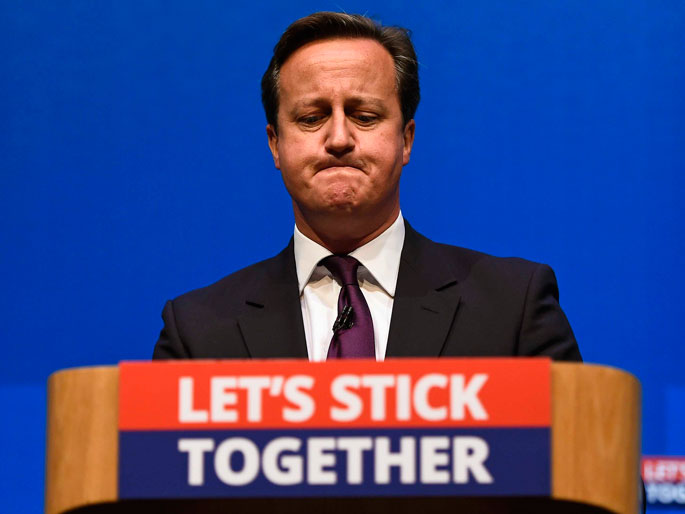The Kremlin is all in favour of Brexit
Why would the Kremlin be so interested in Brexit?

The Russian regime is prepared to take the most radical decisions in its foreign policy, to gain any advantage. Or so the Western establishment firmly believes. Thus, last week, the director of the NATO Stratcom Centre of Excellence Janis Sarts told the British newspaper The Guardian that Russia was using the migrants crisis to topple German Chancellor Angela Merkel. Sarts explained that Merkel’s robust position on anti-Russian sanctions does not suit Moscow. He said that Russia was using the Russian-speaking community in Germany and social networks to fan the flames of the migrant problem. He also pointed out that Russia would be ready to exploit any extreme political forces, whether left or right, if this were to fit in with the Russian agenda
Moscow reacts symmetrically to any criticism or unpleasantness coming its way; and one of Britain’s most vulnerable points is currently Brexit. The question must arise as to whether Moscow will want to turn this a priori controversial theme to its advantage.
The fullest account of Kremlin interest in internal schism in the EU, and a British withdrawal, was given recently in The Guardian by the former prime minister of Belgium, Guy Verhofstadt, who is of the opinion that Putin has three reasons for warmly supporting Brexit:
“Destablising the EU. A British exit would weaken Europe militarily and politically, while providing far-right nationalists across Europe with an example to follow. Far-right political parties in France, Denmark, Sweden and elsewhere are already asking why they can’t have the same, semi-detached arrangement as Britain, along with a referendum too.
“Second, much-needed EU sanctions against Russia are more likely to be dropped if Britain left. Already the resolve of some EU countries has weakened. The UK has, correctly in my view, been one of the strongest advocates in the European council for tough sanctions against Russia.” Verhofstadt also considers that without Britain the opponents of sanctions against Moscow could gain the ascendancy.
“Much-needed EU sanctions against Russia are more likely to be dropped if Britain left.”
“A third reason why Putin would relish a British exit from the EU is because Britain has strongly supported an independent European energy strategy. It is economically and strategically vital for Putin that EU countries remain reliant on Russia’s vast supplies of gas and oil, which he has consistently used as a foreign policy instrument.”
Moscow certainly has an interest in Brexit, but does not yet have at its disposal the real tools to make it happen (though this does not mean that the Kremlin will not try to acquire them in a few weeks or months). Firstly, Britain is one of the richest countries in the EU, very far from the poverty of Greece, for whose exit from the EU the Kremlin actively schemed last year. Secondly, any Kremlin efforts in favour of Brexit, were they to become known to the British public, would of course produce the opposite reaction.
Unity in the face of threats (one of the first of which is Russia) is what the British prime minister David Cameron suggested the Eurosceptics should consider: “Of course, we’re a strong country. We’re the 5th largest economy in the world. We’ve got superb armed forces. But think of the things that have threatened us in recent years: the prospect of a nuclear Iran; Russian aggression in Ukraine; the overwhelming impact of the migration crisis; the poison of Islamist extremism and terrorism.”
Richard N. Haass, president of the US Council on Foreign Relations, has also talked about the need for joint European mobilisation against, inter alia, the threat of Russian aggression: “Great Britain’s decision about its relationship with the EU will not happen in a vacuum. In fact, the timing could hardly be worse. Europe is already facing a perfect storm of fiscal strains, anaemic economic growth, massive inflows of migrants and refugees, and renewed Russian aggression.”
“Great Britain’s decision about its relationship with the EU will not happen in a vacuum”
The Kremlin understands very well that the British referendum is an ‘Achilles heel,’ which, if carefully nourished, could potentially grow into a serious problem; a problem that would be to Russia’s advantage. The EU without Great Britain would not just be 28 less 1, because the whole architecture of the European integration project would change. Richard Haass has no doubts on this score: “An EU without the UK would be one in which Germany would have even more influence than it does now. Such a preponderance of power cannot be healthy in the long run, as it will fuel resentment of Germany and likely leave the EU less willing and able to act together on the world scene. The result would be a weaker Europe …”
All this explains why the Kremlin is doing what it can to fan the flames. Here, for instance, is the view expressed on the state TV Channel 1 summing up the Brussels summit at which David Cameron managed to carve out for Britain a special status with the EU: “While Britons are discussing Cameron’s victory, the compromise has left the European community with a nasty taste in its mouth. The French Le Figaro has called the Brussels-London agreement ‘the kiss of death.’ Political commentators are convinced that, although divorce has been avoided, the slow process of dismantling the Union has already started. Now no one has any reason to respect the terms of reference. The Union’s stability has been destroyed, and this kind of agreement can certainly have consequences. There will always be people wanting to work out a special status.”
President Putin likes those situations, which afford him the maximum number of moves right up until the last decision-making moment. The more uncertainty and problems facing the UK before referendum day, the more Moscow will look for ways to turn that uncertainty to its advantage.



